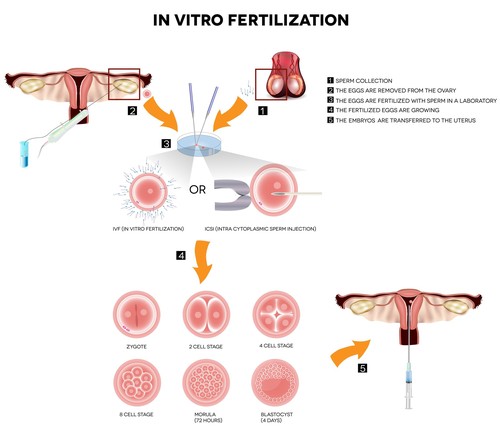
Contents
In this article we will look at:
- What is IVF?
- Who are the right specialists for performing IVF?
- How is IVF performed?
- Who is a good candidate for IVF?
- What risks will I face while undergoing the IVF procedure?
- What are the pre-procedure guidelines I should follow for IVF?
- What should I do after the embryos are implanted?
- What determines the success of an IVF cycle?
You can click on any of the links above to navigate to the section of your interest.
What is IVF?
Infertility is a common issue that affects many couples. This is defined as the inability to conceive despite having well-timed unprotected sexual intercourse for over a year. IVF or In vitro Fertilization is a type of assisted reproductive technology that can help infertile couples conceive a child. This is often used to treat cases of infertility where no cause can be identified. IVF is a combination of medication and surgical procedures to induce ovulation, and help with the fertilization and implantation of embryos in the uterus.
Who are the right specialists for performing IVF?
IVF is generally performed by Gynecologist doctors. Many gynecologists have a special interest in Fertility Treatment and do additional certification and qualifications as an infertility specialist. This procedure is usually performed in clinics and hospitals having special set-up for IVF procedure along with andrology lab.
You can find a list of top IVF doctors & centers in your city at the following links:
How is IVF performed?
There are 4 main steps to the IVF process. A single round of treatment can take several months.
Step 1: Ovulation induction
This involves taking medication to help the ovaries produce eggs. Depending on the functioning of the ovaries, this medication may need to be taken for several months. Regular blood tests and ultrasounds are needed during this time to keep track of egg production.
Step 2: Egg retrieval
This is a minor surgery where the mature eggs are removed from the body. The procedure does not require anaesthesia but medication may be given to keep the patient comfortable. A thin, hollow tube is inserted through the vagina into the ovaries and used to gently suction out the eggs.
Step 3: Insemination
This step is performed in a lab. The harvested eggs and sperm are kept in a special container where the eggs may be fertilized. In some cases the sperm may be directly injected into the eggs.
Step 4: Embryo Transfer
After 3-5 days, 2 or 3 embryos are implanted into the uterus.
If any of these embryos attach themselves to the uterine lining, pregnancy will occur.
Who is a good candidate for IVF?
You are eligible for IVF if:
- You have been unable to conceive for over a year
- You have tried other forms of fertility treatment unsuccessfully
- You have blocked fallopian tubes
- You have polycystic ovarian syndrome (PCOS)
- You have endometriosis
- You have uterine fibroids
- You have premature ovarian failure
- You have ovulation disorders
What risks will I face while undergoing the IVF procedure?
The risks of IVF include:
- Cramps
- Bloating
- Mood swings
- Breast tenderness
- Headaches
- Allergic reaction to the medication
- Bleeding
- Infections
- Depression and anxiety
- Multiple births
- Ovarian hyper stimulation syndrome
- Stress
What are the pre-procedure guidelines I should follow for an IVF?
IVF is a long treatment and hence you must choose a clinic carefully. It is essential for the patient to be comfortable with the doctor and his team. Women trying to get pregnant must quit smoking and stoop drinking alcohol before they begin treatment. It is also important to get adequate nutrition and exercise regularly to maintain a healthy BMI.
What should I do after the embryos are implanted?
It is advisable to rest for a day after the embryos are implanted. This gives them a better chance of attaching themselves to the uterus living. Normal activities may be resumed the next day. Any kind of vigorous activities should be avoided.
What determines the success of an IVF cycle?
IVF has a high success rate but not everyone has the same chances of success. Some of the factors that determine IVF success rates are:
- Woman’s age
- Younger women have a higher chance of getting pregnant as compared to older women. Women over the age of 40 years are often advised to use donor eggs.
- Embryo status
- Embryos that are transferred at a more developed stage usually have a higher chance of being implanted in the uterus as compared to lesser developed embryos.
- Reproductive history
- Women who have had children before have a higher chance of a successful IVF cycle. Women who have undergone IVF treatment before unsuccessfully have a low chance of getting pregnant with another round of IVF.
- Cause of infertility
- Women with severe endometriosis have a low chance of getting pregnant with IVF.
- Lifestyle factors
- Smoking and obesity reduce the chances of having a successful pregnancy after IVF. Women who smoke produce fewer mature eggs and have a higher risk of miscarriage. Use of recreational drugs, alcohol and certain types of medications can also be harmful.
Questions answered by trusted doctors

Did you know?
IVF in India
IVF in India has a success rate of 40-60%
IVF Cost
An IVF cycle in India costs between Rs. 60,000 and Rs. 2 lakhs
IVF Benefit
10% of infertile couples benefit from IVF
Related articles
A Spine surgery is a surgical procedure where the herniated disc or spinal stenosis is corrected. This will help in relieving symptoms like severe pain.
Laparoscopy is a surgical diagnostic procedure in which the organs in the abdomen and pelvic region are examined. A thin long tube with a high-resolution camera and high-intensity light is used.
Hernia surgery is a surgical procedure where the lump of fatty tissue is tucked back into its position and a mesh may be placed to strengthen it.

Numerous infertility cases have been treated successfully with homeopathic medicine and they have been reported on homeopathic medical journals. All these cases show how homeopathic treatment restored overall health and helped women, who were previously infertile conceive and have a healthy pregnancy and baby.
Homeopathic remedies can help infertile couples achieve pregnancy even if there are physical conditions that can prevent the implantation of the embryo contributing to infertility or miscarriages .
A homeopathic constitutional treatment will give you best results naturally
You can easily take an online consultation for further treatment guidance and permanent cure without any side effects